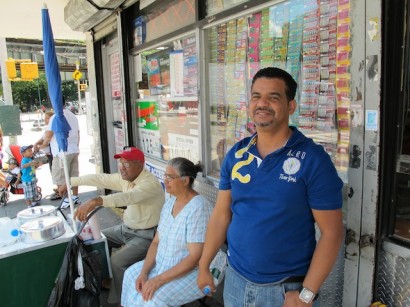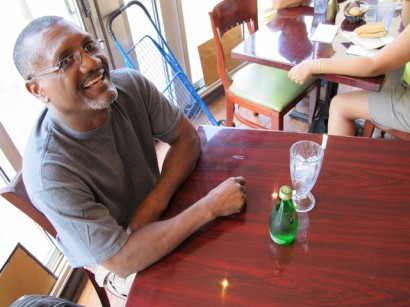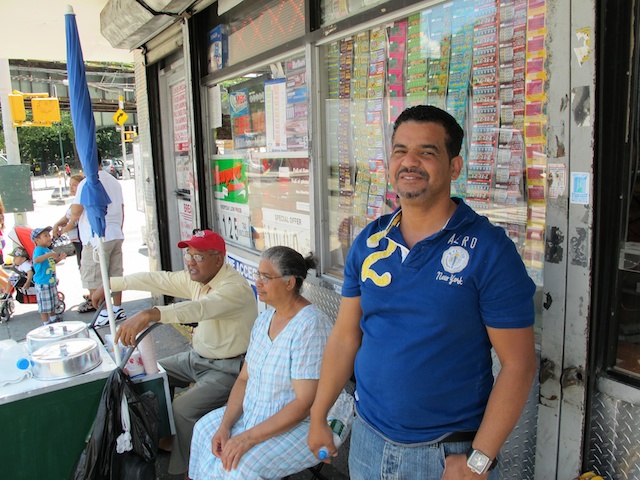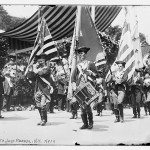
Raoul Rodriguez is one of many Dominican residents of Upper Manhattan expressing doubts about the outcome of the Rangel-Espaillat race. (Photo: Justin Mitchell/Fi2W)
Raoul Rodriguez, 47, spent the better part of Monday afternoon standing at the corner of Dykman Street and Nagle Avenue in Washington Heights, Manhattan, speaking to his fellow Dominicans in rapid-fire Spanish.
He spoke broken English to this reporter in a congenial tone. Sometimes it was difficult to understand him, but on one topic, he was very clear: in his view, the results of last week’s primary in which U.S. Rep. Charles Rangel was challenged by state Sen. Adriano Espaillat and three other candidates suggest voter suppression.
“It’s not good, it’s no good,” he told Fi2W, before adding in his native language: “It’s dirty.”
Rodriguez is one of many members of Upper Manhattan’s Dominican community questioning the results of last week’s election. If elected, Espaillat would be the first Dominican-born member of Congress.
Less than a week ago, almost everyone thought the Democratic primary race in New York’s 13th Congressional District was settled.
After all, Rangel was declared the winner last Tuesday night, with 45 percent of the vote to Espaillat’s 40 percent.
But things quickly changed.
As the week wore on and votes continued to be counted, the margin of victory shrunk with each passing day. By Friday, Rangel was ahead by just over 1,000 votes. On Monday, the latest report from the Board of Elections has him leading Espaillat by just 802 votes, with over 2,000 additional votes yet to be counted.
Moreover, the Dominican American National Roundtable, an advocacy organization for Dominican-Americans, has called on the U.S. Justice Department to investigate claims of voter suppression.
“We’ve received countless phone calls, reports of irregularities from voters,” said Maria Teresa Montilla, the Roundtable’s president, in an interview with Fi2W. “Particularly Latino, non English-speaking people.”
According to Montilla, complaints ranged from a lack of language interpreting services to voters arriving at their polling places to find their names were not on the rolls.
“It paints a grim picture for openness in elections,” Montilla said.
When asked if her organization suspected purposeful voter suppression, Montilla made no direct accusations, but said the charges must be investigated.
“The number of complaints that we have received definitely point in the direction of something like that,” she said. “I hope that this is looked into, and that they get to the bottom of whether or not there was suppression, and deal with that accordingly.”
The Roundtable has created a hotline for complaints.
Fi2W spoke to one neighborhood resident who asked for anonymity because she was prohibited from speaking about politics by her employer. She said that she had noticed several voters at her polling place complaining of not being on the rolls.
“Why does that have to happen in our community, supporting someone that’s from our nationality?” she said. “That’s the sad part of it, you know?”
The Board of Elections said these suspicions were unfounded. Valerie Vasquez, a Board of Elections spokesperson, also brushed aside the question of inaccurate poll reporting.
“The preliminary election results that we reported on election night are just that, they were preliminary,” she said.
Vasquez explained that on election night, elections officials provided a printout to NYPD officers, who then entered that information into the NYPD computer system. Usually, the NYPD sends these results to the Associated Press, who in turn distributes it to the public.
However, according to Vasquez, on this past election night many police precincts—notably ones located in and around Washington Heights and Inwood—reported “zeroes.” Therefore, the results form these precincts never appeared on the running tallies on news websites such as the New York Daily News, the New York Times, and WNYC.
Vasquez directed Fi2W to speak to the NYPD as to why this happened. An email sent to the NYPD went unanswered.
Vasquez said the Board of Elections has its own method for counting votes. Each ballot is scanned and put on a memory stick, and the Board counts these separately. These tallies are what caused the margin between the candidates to shrink last week, and that count is ongoing.
Vasquez dismissed any claims of a lack of voter access.
“There would never be an instance where a person would be turned away from the poll site,” she said. “They would be offered an affidavit ballot.”
An affidavit ballot allows a voter to declare in writing he or she is allowed to vote. They fill out a ballot, and the Board of Elections later verifies the information and counts the vote.
According to Vasquez, they will all be counted by July 5th.
She added that Espaillat’s campaign has been present for the counting of these ballots.
However, Ibrahim Khan, a spokeman for the Espaillat campaign, says that while the Board has allowed the campaign to be in the same room while ballots are counted, they are not allowed get close enough to see what is happening. “There’s no adequate monitoring,” he complained to Fi2W.
On Monday afternoon, both the Rangel and Espaillat campaigns appeared in New York Supreme Court.

Ramon Silverio, a Washington Heights resident, hopes that the votes will be counted fairly. (Photo: Justin Mitchell/Fi2W)
“At the end of the day it’s not about winning or losing, it’s about making sure this is a free and fair election,” Khan said.
The Espaillat campaign came to court on Monday with a long list of complaints, which Khan referred to as “the whole enchilada,” but ended up pulling their application, with plans to re-file it on Tuesday. Khan called it a “procedural maneuver.”
The Rangel campaign did not respond to requests for comment from Fi2W, but a spokesperson told NY1 that they hoped the matter would be settled rapidly.
Meanwhile, back in Washinton Heights, residents were unsure of what to think.
In a restaurant on 191st Street and St. Nicholas Ave, Dominican-American resident Ramon Silverio, 59, sipped a sparkling water and said he felt the winner in the race was called hastily, and that roadblocks to a fair counting of the Dominican community’s votes are unfortunate.
“There’s a whole leadership that have been in power for forty-two years,” he said referring to Congressman Rangel’s lengthy tenure in Congress, “and it’s not easy to be someone to come in and challenge the leadership. And I think this has to do with that,” he said.
Silverio and other residents echoed the calls from the Roundtable and the Espaillat campaign.
“I hope that the democratic process—that we have to let the democratic process go through, and let us count all the votes,” he said.
Fi2W is supported by the New York Community Trust and the John S. and James L. Knight Foundation with additional support from the Ralph E. Odgen Foundation and the Sirus Fund.




